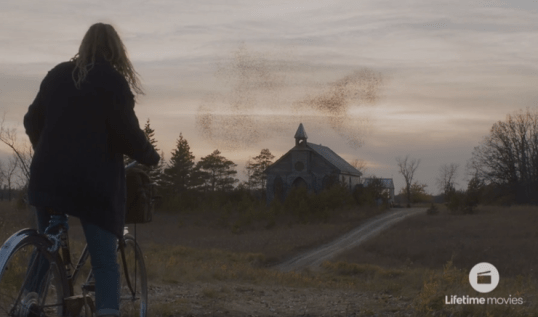With this year’s Sundance Film Festival getting underway in Colorado, I’m going to be spending the next two weeks looking at some films that caused a stir at previous Sundances. Today, I’m taking a look at 2018’s The Tale.

The Tale is all about memory.
Jennifer Fox (Laura Dern) is, as her mother (Ellen Burstyn) often reminds her, nearly fifty years old and childless. She’s been engaged to the sensitive Martin (Common) for three years but she’s in no hurry to get married. As for children — well, she decided a long time ago that she didn’t want to have children. Jennifer is a documentarian and a teacher. She not only records real life but she also teaches others how to do the same thing. She makes films that, in the decades to come, will be used by future students of history who want to know what it was like to live in the late 20th and early 21st Century. And yet, it’s her own history that Jennifer has never come to terms with.
When her mother comes across a school essay that a 13 year-old Jennifer once wrote about her relationship with her riding instructor, Mrs. G (Elizabeth Debicki), and her running coach, Bill (Jason Ritter), Jennifer dismisses her concerns. As Jennifer explains it to Martin, her mother is just upset because Jennifer once had a boyfriend who was “older.” Of course, that older boyfriend was in his 40s. What’s obvious to everyone but Jennifer is that her coach took advantage of and raped her. Jennifer, however, refuses to accept that. She refers to the coach as being her “lover” and, more than a few times, she attempts to dismiss the whole topic by shrugging and saying, “It was the 70s.”
It’s not that Jennifer doesn’t realize the truth about what actually happened. Laura Dern gives a fiercely intelligent performance as Jennifer, one that slowly and deliberately peels away at the layers of defensive protection that Jennifer has spent the past 35 years developing. Jennifer knows what happened but she’s allowed her memory to cloud the reality of it, largely because that’s the only way that she could deal with the aftereffects of Bill’s sexual abuse. When Jennifer thinks back to the summer that she spent with Mrs. G and Bill, she first sees herself as she was when she was 15 years old, curious and headstrong. It’s only when Jennifer looks at a photograph that was taken that summer that she sees starts to see herself as she really was, an introverted and vulnerable 13 year-old (played by Isabelle Nelisse) who was groomed and abused by two predators.
As Jennifer investigates her past and finally begins to understand what really happened over the course of that summer, her memories begin to change. Hazily-remembered conversations take on new meaning and she begins to understand that terrible truth between the looks that were often exchanged between Bill and Mrs. G. At times, the older Jennifer finds herself interrogating her memories of Bill, Mrs. G, and even her younger self. She demands to know how they could have done what they did and their answers leave you wondering whether you’re hearing what they would really say or if your just hearing what Jennifer would hope they would say. When Jennifer talks to others who were around that summer, she’s shocked to learn that she wasn’t the only one who Bill abused and her insistence that she was Bill’s lover (as opposed to his victim) sounds more and more hollow. When Jennifer finally does track down some of her abusers, you wonder if their somewhat confused reactions are due to guilt or if it’s possible that there were so many victims that they don’t even remember what they did to Jenny Fox. And if they do remember, they seem to be either horrifically ignorant or curelly unconcerned about the consequences of their actions.
It’s a brave and powerful film, one that is made all the more disturbing by the fact that director and screenwriter Jennifer Fox is telling her own story. At least year’s Sundance Film Festival, it premiered to acclaim and controversy. There was also some surprise when, instead of securing a theatrical release, the film was instead sold to HBO. At the time, there was a lot of concern that the film’s power would somehow be diluted as a result of playing on television as opposed to a big screen. However, in hindsight, the small screen — with its unavoidable vulnerability — was the perfect place for this uncompromising and emotionally raw film.
The Tale is not an easy film to watch but it is an important one. It’s a film for anyone who has ever struggled to come to terms with the past. It’s both a reminder that you’re not alone and a warning to not ignore or laugh off your suspicions. It’s also a good example of the type of film that probably would never have been discovered if not for Sundance. There’s a lot of legitimate criticism that one can direct towards the Sundance Film Festival but occasionally, it does do what it’s supposed to do.

